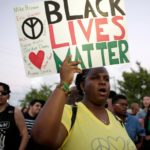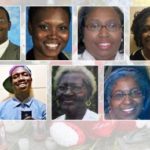The murders of nine church members during Bible study in Charleston, South Carolina, shook our nation and the world this year. Now the victims familes share why forgiveness was their only option.
Last June our hearts were pierced by the news: Nine church members were killed while worshipping at the Emanuel African Methodist Episcopal (A.M.E.) Church in Charleston. They welcomed Dylann Roof, 21, into their midst that night. He murdered them minutes later.
At Roof’s bond hearing, family members of the victims were asked whether they would like to speak. One by one, relatives stood up, expressing pain and sorrow—and also forgiveness and mercy. Alana Simmons, 26, spoke on behalf of her family after losing her grandfather, the Reverend Daniel Simmons, Sr., that fateful summer evening: “Although my grandfather and the other victims died at the hands of hate, everyone’s plea for your soul is proof that they lived in love, so hate won’t win.”
Since then those three words have sparked a movement for Simmons, an elementary music teacher in Norfolk, Virginia, and the oldest of Rev. Simmons’s four grandchildren. She was inspired to create the #hatewontwin social media campaign, which now has more than 20,000 Facebook followers. Its nonprofit arm raises money for hate crime victims and educates young people on different races and cultures.
While Simmons travels across the country spreading the message, some have wondered how the families of The Charleston Nine could forgive so quickly. Editorials have announced, “Black America should stop forgiving white racists,” noting that no one expected Americans to forgive terrorists in the immediate aftermath of 9/11. “The spirit of forgiveness has nothing to do with the shooter,” Simmons explains. “I didn’t do it so he can sleep at night. Forgiveness is not for others. We lost our grandfather. Obviously we’re hurting. But there is no way I can carry on my grandfather’s legacy while harboring hate.”
Daniel Simmons, Jr., Alana’s father, agrees. Forgiveness, he says, is “a requirement that God has set for us as Christians. We want to acknowledge the devil and that this was a hate crime. But we also acknowledge God’s power over him.” His sister Rose Simmons concurs. “My father was a determined individual. Duty was number one to him,” says the Newport News, Virginia, musician and hairstylist. “The moment he closed his eyes, mine were opened. I try to remember everything that he ever said to me, and now it’s gold.”
But how do you forgive exactly when the wounds are still so raw and so deep?
“It can’t be forced,” says Linda Young, a counseling psychologist in The Woodlands, Texas, and senior scholar at the Council on Contemporary Families. Authentic forgiveness has to come from a place of strength, and a person has to be psychologically ready to do it. “You have to be in a place where it doesn’t matter what the other person’s response is. It can’t be about doing it to get something in return. You can’t want revenge.” If forgiveness is done right, the results can truly be miraculous.“What it’s doing is taking something that’s eating you alive on the inside and letting go of it, so it’s no longer yours to bear,” Young says. “That can make healing go faster. It’s done in order to move out of a place of despair. It’s done because being unforgiving can stall your ability to love again and to have hope for your own future.”
Nadine L. Collier lost her mother, Ethel W. Lance, in the Charleston shooting. She was the first member of her family to express forgiveness toward the shooter at the courthouse. “I felt that I had to do that regardless of what had happened to me,” she says. “I was taught by my mother not to hold grudges, and I know she would say, ‘I need for you to live your life and to forgive him.’ I can’t hold that animosity in my heart because then I’m going to make myself sick.
I don’t want that feeling—that anger and bitterness.” Collier says she would even listen to the shooter if there ever came a day he wanted to talk. “Because to me, he’s a young man,” she says. “He’s a boy…a child. He hasn’t experienced anything.”
Still, forgiveness doesn’t take the hurt away. Remembering how she used to talk to her mother as many as four times a day, she breaks down and cries. “I’m hurting,” she says, “because I know my mom had some more living to do. But I’m not angry. There’s a difference.”
The Reverend Waltrina Middleton, a cousin of DePayne Middleton, has a different perspective on the topic and talks about what she calls a “rush” to forgiveness. DePayne was like a sister to her, she says. They “grew up literally right next door to each other along with our own two sisters. The four of us were inseparable.”
When Bethane Middleton-Brown, DePayne’s sister, spoke at the bond hearing, she said she was a “work in progress,” notes Rev. Middleton. “She never said in that moment that she or we forgave. This is a narrative that was created by the media, who refused to listen to us to try to understand the heart of our pain and the fact that we are still grieving. With the tragic killing of nine remarkable human beings, the headline dominating the news was ‘The Families Forgive.’ ”
“There was a great rush and urgency to get to that headline of forgiveness,” she adds, “bypassing the narratives in between.” For Rev. Middleton, forgiveness in our society all too often becomes a kind of code for “we don’t have to be accountable for our inaction, which perpetuated these acts of violence.”
“The truth of the matter is, we have not moved on,” Rev. Middleton says. “We still have a real problem of racism, police brutality and a culture of racialized violence in Charleston, in the South and in this country. It is not enough to take down the flag. It is not enough to even catch the young man who murdered our family members. It is not enough if these tragedies continue to happen.”
Loma K. Flowers, M.D., a University of California at San Francisco clinical professor of psychiatry, agrees that the concept of forgiveness is often misunderstood by those who perpetrate violence and by their victims.
“Too many times you see abusers or cheating spouses who think they have a right to forgiveness just because they’ve apologized,” Flowers says. “No one is entitled to forgiveness, and its true power lies with the party injured, who must experience the full impact. It’s important to do all the stages of grief. First shock, then missing the person. The third stage is anger and protest. Then comes despair. Finally you get to detachment, and it’s at that stage that you can really decide to forgive.”
For the Simmonses—Rose, Alana and Daniel—the act is one demanded by their Christian faith. “It doesn’t mean that I agree with what they did or that I want to suffer at their hands or that I don’t get angry or want to get even sometimes,” Rose explains. “It’s not saying, ‘Oh, I forgive you,’ lightheartedly. There’s a process, and it’s painful. It’s through tears and a self-truth you must face. That’s where you find out who you really are. The battle is between you and your heart.”





